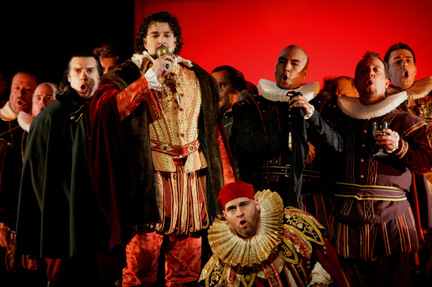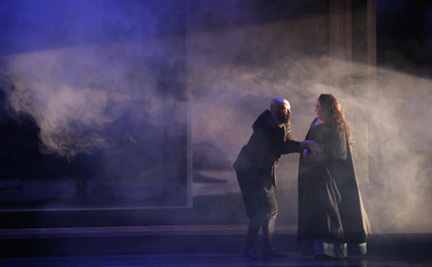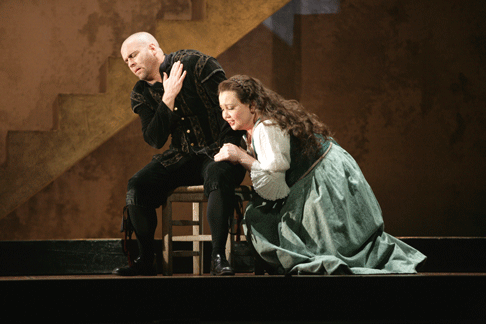Новая мировая звезда из казани
| Вид материала | Конкурс |
- План проведения. Классный Дорогие ребята ! Япредлагаю вам сегодня совершить экскурсию, 57.56kb.
- В казани обсуждают перспективы исламского банкинга (Казань, 5 июня, «Татар-информ»,, 70.03kb.
- Виртуальное путешествие по музеям и улицам Казани Национальный музей Республики Татарстан, 1014.53kb.
- Доклад начальника Управления здравоохранения г. Казани Р. У. Ахметова на тему: «Об, 39.16kb.
- «О состоянии и развитии музеев г. Казани», 92.38kb.
- «сказка для тех, кто умеет мечтать», 123.04kb.
- Исламов Ф. Ф. Роль Казани и Елабуги в развитии культуры, просвещения братских народов, 97.71kb.
- «О реализации в городе Казани республиканской долгосрочной целевой программы «Доступная, 302.19kb.
- «Организация и проведение в городе Казани Декады пожилых людей», 107.34kb.
- Первый канал, новости экономики, 18. 07. 2008, Евтеев, 06:, 8732.19kb.
Houston Grand Opera’s Rigoletto: |
 Credit: Photo by Felix Sanchez Eric Cutler (Duke of Mantua) and Scott Hendricks (Rigoletto) |
Verdi’s conception of tragedy, as it unfolds in “Rigoletto,” was sharpened by his lifelong study of the works of Shakespeare and Schiller. For both of these great masters, the idea of tragedy was that of a society destined, by its own axioms and practices, to fail. Classical tragedy, from Aeschylus and Sophocles forward, was never about the “failure” of a “tragic hero,” as the romantics of the last two centuries, who have dominated academic discussions, would have you believe. Rather, the subject of tragic drama is the pervasive corruption of a society, which is fated to a tragic end due to its corrupt practices, and in which the protagonist, regardless of whatever sympathetic qualities he may have possessed, was unable to overcome the destiny of that society.
In “King Lear,” for example, the tragedy which engrossed Verdi prior to taking on “Rigoletto,” Shakespeare presents the story of a doomed kingdom, doomed not by any one individual figure, but by all of them. There is no redemption within the play, nor is there a simple “moral lesson” to be gleaned. The purpose of writing tragedy—as Aeschylus would inform today’s hapless, and clueless, babbling commentators—is not to offer options within the drama, to be selected by the audience, which might have allowed a happier, alternative ending. “If only Cordelia would have been honest,” a college professor once lectured an honor’s symposium, “perhaps the kingdom would have been spared the disastrous outcome of `King Lear.'”
Shakespeare>
This disaster, Shakespeare is telling his audience in Lear, Macbeth and Hamlet, actually befell a society much like our own, when endemic corruption replaced respect for the dignity of man, and the manic striving for wealth and power displaced the pursuit of new ideas, as the force driving the leaders of the polity. The same is found in Schiller. For example, in his powerful “Don Carlos,” the Spain, which had been a meeting place of cultures, became the rotting center of the Holy Roman Empire and the murderous Inquisition.
It is a tragedy in itself, that modern audiences have embraced the “tragic hero” theory of the Romantics, who moved aggressively, and with a bitter hatred, against the classical form of drama. Great tragedians composed their histories—for most of these works are real history—with the belief that an audience would become better only when confronted, by viewing on stage, acts of cruelty and barbarism, which are based on a true history, and which had destroyed a previous civilization, and in which they could see, if only dimly, shadows of the same, in their own culture.
Rigoletto As A Shakespearean Drama
Verdi’s Rigoletto is definitely such a classical, Shakespearean tragic drama, as it occurs in a society which possesses no redeeming qualities. While one may be genuinely touched by what appears to be Rigoletto’s love for his daughter, is it possible to overlook his role in supporting, even inciting, the disgusting behavior of the Duke’s degenerate court? “La maledizione,” the curse —which was originally the title Verdi had chosen for the opera—which is hurled at Rigoletto by Monterone, whose family had been victimized by the Duke’s nasty licentiousness, and which is the theme of the opera, only makes sense because there is no way out of the degeneration of the court, no matter how much Rigoletto tries to “become another person” behind closed doors at home.
 Credit: Photo by Felix Sanchez Scott Hendrick (Rigoletto) and Albina Shagimuratova (Gilda) |
As for sympathy for Gilda, her self-dooming desire to protect the Duke, is not based on naiveté or love, but self-delusion. She goes to her death believing that he really loves her. Of course, he is totally unaware of her ultimate sacrifice on his behalf. Her death is “tragic,” in that it is sad, but not surprising, in a society where there is no virtue which goes unpunished, no evil desire which cannot be fulfilled. One might as well argue that there is some decency in Maddalena, the whore who works for her murderous brother Sparafucile; after all, she acts to spare the Duke, though with a lascivious intention in mind.
Rigoletto’s ultimate reckoning, like that of Oedipus or Macbeth, was foretold early in the drama, and his fall comes as no great surprise. It is Verdi’s genius that, even though the audience strongly suspects that the curse will be realized, we still are pulled into the opera, and follow the unfolding of the “maledizione” with rapt attention. The unfolding is relentless, and the audience is made aware of it from the ominous opening notes of the horns in the overture, in a theme which is repeated throughout the opera. And despite this prescience, shaped by Verdi, from the outset, that something horrible is coming, the audience is still shaken by the ending, and leaves the theater uneasy and somewhat troubled.
HGO Production Intense and Relentlessness
The production last month, by Houston Grand Opera, offered vintage Verdi, presenting the tragedy in its most profound classical form. The tension from the overture was sustained throughout, highlighting the relentless march of fate to the very end. There was no let up, no escape. At the same time, the singing was marvelous, especially in the ensemble pieces, as the interplay between the voices was transparent—including the voices from the orchestra, as Verdi offers strings and winds frequent opportunities, both as sectionals, and as solos, to interact, as distinct voices, with the singers.
Audiences in Houston have come to expect excellence from the orchestra, under the direction of Conductor Patrick Summers. This was again the case in Rigoletto, as he demonstrated the right touch throughout, especially in the beautiful duets at the end of Act I, between Rigoletto and Gilda, then Gilda and the Duke. Summers let the singers set the pace, with the orchestra functioning almost as an additional voice in the duets, at the same time serving to heighten the drama, repeatedly sounding the alarm for the dangers lurking ahead.
Scott Hendricks, baritone, was a superb Rigoletto, vocally, and in a surprising way, with a kind of athleticism which highlights the extent to which Rigoletto’s physical deformity is mirrored in the depraved role he plays in the court. Soprano Albina Shagimuratova demonstrated in her Gilda why she will be a featured performer for some time to come. She sang the demanding role almost effortlessly, with a luminescent quality in her upper register, which combined sweetness and power. Hendricks and Shagimuratova are both former Houston Grand Opera Studio artists, once again demonstrating that its alumni leave the program capable of handling leading roles with great skill and artistry.
Eric Cutler’s Duke of Mantua (tenor) conveyed the two sides of his character quite effectively, showing that the charming seducer and the brutal misogynist can be one and the same. In the scene with Gilda, as the poor student Gualtier Malde, he sang with a winning tenderness, which is at odds with his dismissive view of women in “La donna e mobile.” On opening night, his singing of “La donna e mobile” came across somewhat flat; however, when I saw a second performance, Cutler captured the ribald character of the Duke, charming the audience, as Verdi had intended.
The final act was quite chilling, the staging brilliantly done, with a chorus effectively recreating the howling of the storm, as Rigoletto’s plan to outflank the curse goes awry, and the curse is fulfilled. Mezzo-soprano Maria Markina’s Maddalena was overtly sensual, squeezing out every bit of lusty evil in the role, while bass Andrea Silvestrelli as Sparafucile was a truly sinister presence on stage, whether lurking in the shadows, or preparing to kill at his inn.
As the theater emptied, with Rigoletto’s final cry of anguish still ringing in the ears of those leaving, it was clear that a certain unsettling feeling would remain with them for some time. By thus jolting the audience out of its comfort zone, the HGO production of Rigoletto had fulfilled the intention of Verdi, by presenting “a creation worthy of Shakespeare.”
Мне выпало счастье с моей женой, Гейл Мирзаянов, присутствовать на этом спектакле, 19 апреля 2009 г, и после представления познакомиться с великой татарской певицей. Она прекрасно говорит на родном языке. Что говорить, талантище!
19 Apr 2009
Shagimuratova steals show in HGO’s Rigoletto
On a stormy evening in Houston (both in and outside of the house), Houston Grand Opera’s opening night production of Verdi’s Rigoletto went off with a thunderous bang.
Giuseppe Verdi: Rigoletto
Scott Hendricks: Rigoletto; Eric Cutler: Duke of Mantua: Albina Shagimuratova: Gilda; Andrea Silvestrelli: Sparafucile; Bradley Garvin: Monterone; Maria Markina: Maddalena; Jamie Barton: Giovanna; Adam Cioffari: Count Ceprano; Octavio Moreno: Marullo; Faith Sherman: Countess Ceprano. Houston Grand Opera Chorus and Orchestra. Patrick Summers, conductor. Lindy Hume, director.
Above: Scott Hendricks in the title role of Verdi's Rigoletto
All photos by Felix Sanchez courtesy of Houston Grand Opera
- ссылка скрыта
- Send to a Friend


 The cast boasted Eric Cutler in his role debut as the Duke, Texan Scott Hendricks as Rigoletto, and Houston favorite Andrea Silvestrelli as Sparafucile. While the men acquitted themselves well, none compared to the performance given by Russian soprano Albina Shagimuratova as Gilda.
The cast boasted Eric Cutler in his role debut as the Duke, Texan Scott Hendricks as Rigoletto, and Houston favorite Andrea Silvestrelli as Sparafucile. While the men acquitted themselves well, none compared to the performance given by Russian soprano Albina Shagimuratova as Gilda.Houston patrons know Shagimuratova well, having heard her in previous seasons when she was a member of the company’s young artist program. Her Gilda, however, gave them a chance to see the soprano after her development—and what a development it was. From the first note of her duet with Hendricks, Shagimuratova sent a clear, full lyric voice into the house that spun line after line of legato with remarkable ease. Her “Caro nome”—the best I’ve ever heard—employed perfectly executed trills and just the right amount of ornamentation. Shagimuratova’s clarity was astounding in both the act three quartet and the storm trio, projecting easily over both the orchestra and the strong voices of her colleagues. Her acting was spot on, and she showed more sensitivity to her role than any of the other characters. Albina Shagimuratova’s Gilda was one to remember.
Eric Cutler, in his role debut, gave a solid assumption of the licentious Duke of Mantua. His voice remained the light instrument it was when he first burst onto the international scene, but he managed to add enough heft to his sound to get past the heavier orchestrated sections of Verdi’s score. Cutler seemed most comfortable in the lyrical sections, showing off a strong top in his act one duet with Gilda and later giving a seamless rendition of “Parmi veder le lagrime.” His Duke isn’t perfect yet; the tenor forgot at least two lines and needs to polish up his phrasing, but with time the role could prove strong for him.
Texan Scott Hendricks gave a mixed performance as Rigoletto. The San Antonio native has the range, heft, and legato for the role, but on opening night his vocal clarity too often gave way to an over darkened, muddy sound. His “Cortigiani” showed great pathos, but that was it—you got the feeling from Hendricks’ portrayal that he was simply imposing a romantic portrayal (from other roles in his repertoire, like Silvio or di Luna) on a father-daughter relationship. It didn’t always work, and was sometimes awkward. More work vocally and theatrically could greatly improve his portrayal.
Italian bass Andrea Silvestrelli gave his usual effortlessly powerful performance. In a production that focused on shadows, fog, and darkness, Silvestrelli bounded in and out of sight, showing up at just the right times and portraying the assassin with just enough dark humor. The Italian’s powerful bass boomed throughout the house to great effect but with careful attention not to overpower his colleagues.
 Octavio Moreno (Marullo) and Eric Cutler (Duke of Mantua)
Octavio Moreno (Marullo) and Eric Cutler (Duke of Mantua) Silvestrelli’s on-stage sister, Russian mezzo Maria Markina, gave a sexually charged depiction of Maddalena. Markina, a member of HGO’s young artist program, had incredible chemistry with Cutler—the act three quartet was one of the highlights of the night, with Cutler and Markina’s interaction bordering on soft porn while Shagimuratova’s Gilda looked on. Markina’s warm voice showed ample size for the Brown Theater; look for her to grow into larger roles with the company over the next few years. Of the supporting roles, Bradley Garvin as Monterone sang particularly well, projecting a large, ringing bass-baritone into the house in the curse scene.
The subtle production focused mainly on colorful backgrounds and timely scene changes. Several period paintings adorned the backdrops while the sets for acts one and two were sparse. The final act brought out a framed set for Sparafucile’s house which served the quartet action well. Director Lindy Hume could have worked with Hendricks a little more on his acting, which wasn’t so much non-existent as it was misguided and confusing at times. Hume provided some clever touches but mostly let the action carry on in a traditional way. Patrick Summers’ conducting was lethargic in the first act but came to life afterwards.
 Scott Hendricks (Rigoletto) and Albina Shagimuratova (Gilda)
Scott Hendricks (Rigoletto) and Albina Shagimuratova (Gilda) If you’re wondering how good a Rigoletto can be without a perfect baritone, you need look no further than HGO’s production—with a soprano as Gilda who gave one of the most complete performances in recent HGO history combined with a solid supporting cast, the company has a sure hit on its hands.
Paul Wooley
